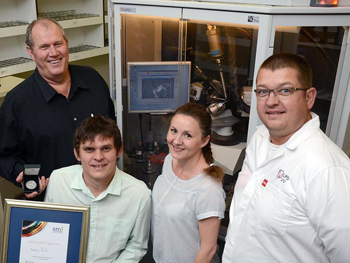
From the left are: Prof Andreas Roodt, Renier Koen, Dr Marija Zbacnik and Prof Deon Visser.
Photo: Supplied |
Staff members in the Department of Chemistry at the University of the Free State (UFS) excelled at recent international conferences. Prof Andreas Roodt, Head of the Department of Chemistry, was honoured at the Pan African Meeting of the International Year of Crystallography IYCr2014. This event was hosted on our Bloemfontein Campus and delegates from 22 countries delivered their papers at the congress.
Prof Roodt received a medal from the President of the Moroccan Crystallographic Association, Prof Abdelmalek Thalal, for 'Building Science in Africa through Crystallography as President of the European Crystallographic Association'. Prof Deon Visser gave a keynote lecture at this meeting, while Dr Marija Zbacnik, post-doctoral fellow in Chemistry, received a prize for the best poster presentation.
Similarly, Chemistry PhD student, Renier Koen, received the prize as best student speaker at the Light Metals AMI (Advanced Metal Initiative) conference held at Kwa Maritane in Pilanesberg. Plenary speakers included delegates from the United Kingdom, the United States, India, China and South Africa.
Profs Roodt and Visser received a special scroll for having produced the best student speakers at the AMI series of conferences for the past three years in a row. The previous best student lectures were presented by Maryke Steyn (2012) and Tinus Viljoen (2013).